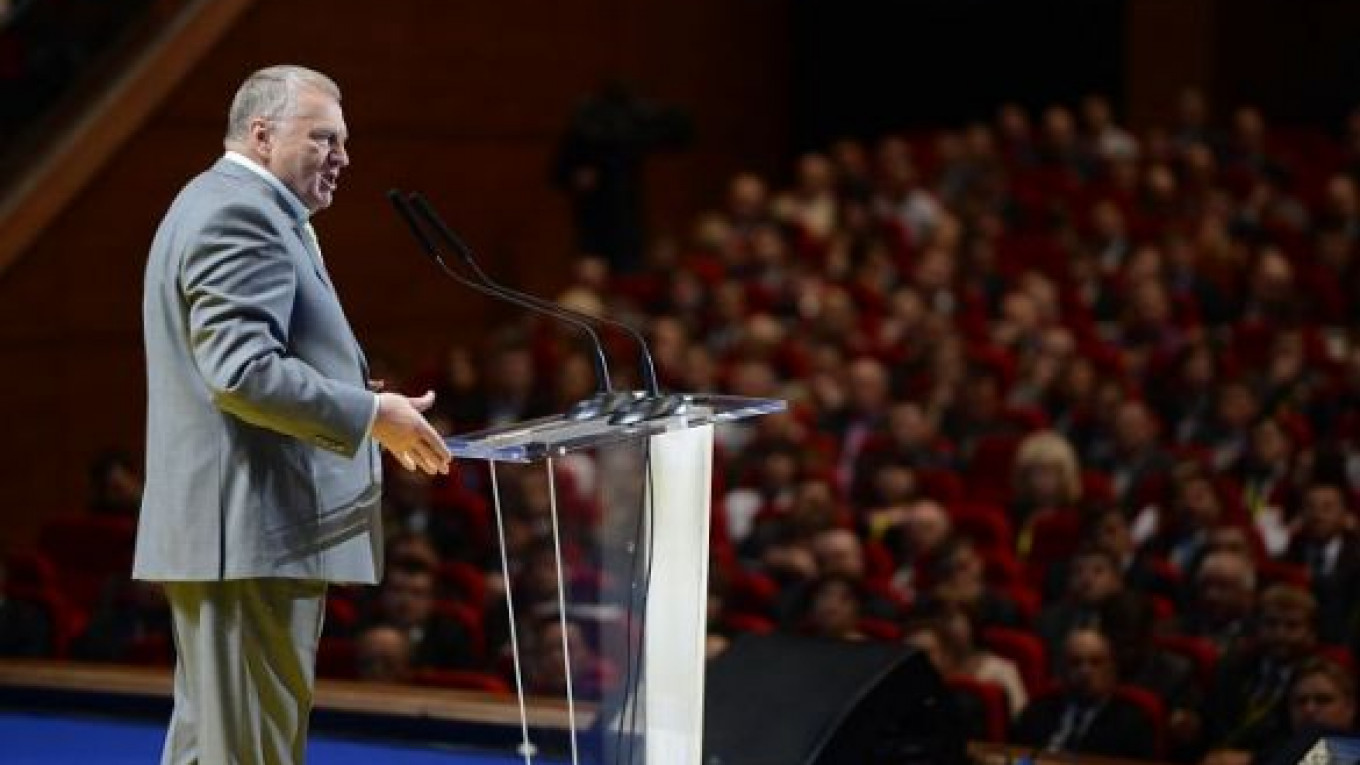Nationalist politician Vladimir Zhirinovsky was re-elected leader of the Liberal Democratic Party of Russia on Monday, quashing speculation that he would hand over control to an anointed successor after more than two decades at the helm.
"I will be with LDPR for all eternity, forever. I will represent the party in elections as long as my candidacy is put forward," Zhirinovsky said in a rambling speech laden with patriotic messages and anti-Western rhetoric at LDPR's 26th party congress in Moscow.
"Unlike Boris Berezovsky, I still have a reason to live," he said, referring to the self-exiled oligarch and prominent government critic who died in his home in southern England in unclear circumstances on Saturday.
Berezovsky, whose defining characteristic Zhirinovsky described as his "utter individualism," was reportedly suffering from depression in the weeks leading up to his death, telling a Russian journalist from Forbes magazine that he had "lost the meaning of life."
Although LDPR delegates overwhelmingly backed their flamboyant leader as party chief at Monday's event in Crocus City Hall, Zhirinovsky, 66, hinted that a party heavyweight could take over at LDPR's next congress in 2017.
Zhirinovsky named his son, State Duma Vice Speaker Igor Lebedev; Smolensk region Governor Alexei Ostrovsky; Vladimir Ovsyannikov, deputy head of the party's faction in the Duma; and LDPR lawmaker Yaroslav Nilov among potential successors.
Setting LDPR's goals for the coming years, Zhirinovsky said the party should strive to attract young blood into its ranks and strengthen its work in the regions.
"We must rejuvenate ourselves," he said, citing grassroots democracy as an essential tenet of LDPR's party philosophy and angrily rebuffing rumors that Russia's lower house could be dissolved.
"LDPR members should be patriots and love their country, we shouldn't be jealous of foreigners. We aren't rich in terms of the money that's in our pockets, but we are rich with the arable land that feeds us. We have everything; they have nothing," Zhirinovsky said.
Stepping up the anti-Western tone of his speech, Zhirinovsky said that the overriding aim of a European Union-led bailout plan for debt-ridden Cyprus was to "steal Russian money" and that critical national media including Moskovsky Komsomolets, Novaya Gazeta and Dozhd TV were paid to deceive Russian readers.
Special censure was reserved for the United States, which he accused of bringing corruption to Russia and sowing discord in Eastern Europe, and Ukrainian President Viktor Yanukovych, whom he attacked for choosing the EU's headquarters in Brussels for his first foreign visit.
"It pains us that we have a traitorous enemy in our native Slavic house," Zhirinovsky, a qualified lawyer and five-time presidential candidate, said in reference to Yanukovych.
In more lighthearted comments, Zhirinovsky explained Russia's low birth rate by the fact that Soviet authorities forced women to work "in factories wielding sledgehammers" and said Russians could take heart from the fact that Europe would suffer similarly harsh climactic conditions were the Gulf Stream to shift.
Zhirinovsky, who has headed LDPR since its creation in 1992 and co-founded the Liberal Democratic Party of the Soviet Union, steered clear of criticizing President Vladimir Putin in his speech, which lasted for more than an hour and was frequently interrupted by rapturous applause.
He did, however, take a dig at the ruling United Russia party, saying the presidential administration stood behind its success.
LDPR, known for being loyal to the Kremlin, is Russia's oldest political party. With 56 deputies, it has the fourth-largest faction in the Duma after United Russia, the Communists and A Just Russia.
Contact the author at a.winning@imedia.ru
Related articles:
A Message from The Moscow Times:
Dear readers,
We are facing unprecedented challenges. Russia's Prosecutor General's Office has designated The Moscow Times as an "undesirable" organization, criminalizing our work and putting our staff at risk of prosecution. This follows our earlier unjust labeling as a "foreign agent."
These actions are direct attempts to silence independent journalism in Russia. The authorities claim our work "discredits the decisions of the Russian leadership." We see things differently: we strive to provide accurate, unbiased reporting on Russia.
We, the journalists of The Moscow Times, refuse to be silenced. But to continue our work, we need your help.
Your support, no matter how small, makes a world of difference. If you can, please support us monthly starting from just $2. It's quick to set up, and every contribution makes a significant impact.
By supporting The Moscow Times, you're defending open, independent journalism in the face of repression. Thank you for standing with us.
Remind me later.






